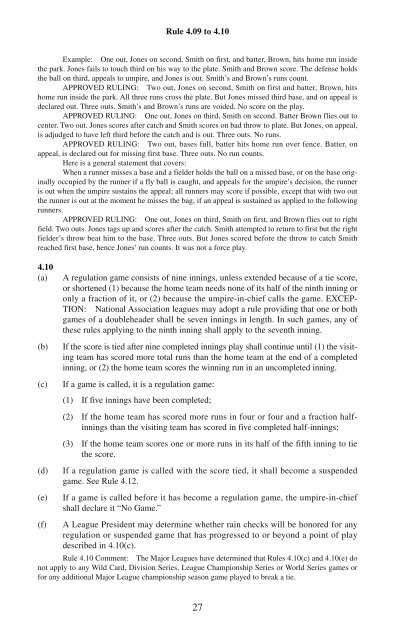OFFICIAL BASEBALL RULES
1SPD1Aq
1SPD1Aq
You also want an ePaper? Increase the reach of your titles
YUMPU automatically turns print PDFs into web optimized ePapers that Google loves.
Rule 4.09 to 4.10Example: One out, Jones on second, Smith on first, and batter, Brown, hits home run insidethe park. Jones fails to touch third on his way to the plate. Smith and Brown score. The defense holdsthe ball on third, appeals to umpire, and Jones is out. Smith’s and Brown’s runs count.APPROVED RULING: Two out, Jones on second, Smith on first and batter, Brown, hitshome run inside the park. All three runs cross the plate. But Jones missed third base, and on appeal isdeclared out. Three outs. Smith’s and Brown’s runs are voided. No score on the play.APPROVED RULING: One out, Jones on third, Smith on second. Batter Brown flies out tocenter. Two out. Jones scores after catch and Smith scores on bad throw to plate. But Jones, on appeal,is adjudged to have left third before the catch and is out. Three outs. No runs.APPROVED RULING: Two out, bases full, batter hits home run over fence. Batter, onappeal, is declared out for missing first base. Three outs. No run counts.Here is a general statement that covers:When a runner misses a base and a fielder holds the ball on a missed base, or on the base originallyoccupied by the runner if a fly ball is caught, and appeals for the umpire’s decision, the runneris out when the umpire sustains the appeal; all runners may score if possible, except that with two outthe runner is out at the moment he misses the bag, if an appeal is sustained as applied to the followingrunners.APPROVED RULING: One out, Jones on third, Smith on first, and Brown flies out to rightfield. Two outs. Jones tags up and scores after the catch. Smith attempted to return to first but the rightfielder’s throw beat him to the base. Three outs. But Jones scored before the throw to catch Smithreached first base, hence Jones’ run counts. It was not a force play.4.10(a)(b)(c)(d)(e)(f)A regulation game consists of nine innings, unless extended because of a tie score,or shortened (1) because the home team needs none of its half of the ninth inning oronly a fraction of it, or (2) because the umpire-in-chief calls the game. EXCEP-TION: National Association leagues may adopt a rule providing that one or bothgames of a doubleheader shall be seven innings in length. In such games, any ofthese rules applying to the ninth inning shall apply to the seventh inning.If the score is tied after nine completed innings play shall continue until (1) the visitingteam has scored more total runs than the home team at the end of a completedinning, or (2) the home team scores the winning run in an uncompleted inning.If a game is called, it is a regulation game:(1) If five innings have been completed;(2) If the home team has scored more runs in four or four and a fraction halfinningsthan the visiting team has scored in five completed half-innings;(3) If the home team scores one or more runs in its half of the fifth inning to tiethe score.If a regulation game is called with the score tied, it shall become a suspendedgame. See Rule 4.12.If a game is called before it has become a regulation game, the umpire-in-chiefshall declare it “No Game.”A League President may determine whether rain checks will be honored for anyregulation or suspended game that has progressed to or beyond a point of playdescribed in 4.10(c).Rule 4.10 Comment: The Major Leagues have determined that Rules 4.10(c) and 4.10(e) donot apply to any Wild Card, Division Series, League Championship Series or World Series games orfor any additional Major League championship season game played to break a tie.27


